Time is typically something that is elusive. But to Linnea Evans, quantifying the use of time is one of the keys components in identifying structural racism.
Through her innovative research, Evans, an assistant professor at Northern Arizona University’s Center for Health Equity Research (CHER) and Department of Health Sciences, is proving how racial and ethnic minoritized teens are often socially or financially excluded from stress-relieving activities, while also stepping up to manage demands and responsibilities that not all teens have to contend with daily.
Time-use opportunities may include social and extracurricular activities, and time demands may include commuting long distances to school while also managing responsibility for the care of parents, grandparents or siblings, cooking and other household chores, and working jobs to help with family living expenses.
“Allocation of time is a way of looking at different layers of marginalization — the systems that come together and influence our day-to-day lives,” Evans said of her work. “It is built-in structural racism.”
Evans initially began her time research at the University of Michigan. In her new position at CHER, she is now expanding her work to examine the role of place-based policies across the U.S. on the time-use profiles of teens, including a study documenting the potentially disparate impact of school closing/re-opening schedules during the COVID-19 pandemic on teens.
Entering public health
Evans said she switched to public health after interviewing Sherman A. James, a social epidemiologist at Duke University’s Sanford School of Public Policy, when Evans was an undergraduate in biology at the University of Michigan (UM) and in the Undergraduate Research Opportunity Program. James devoted extra time to discussing public health with her, which guided Evans on a different path than medicine.
“I had no idea what he did at the time,” Evans said of James’ distinguished position. “But I was so fortunate. That experience helped me decide to get the master’s in public health.”
After she graduated from Boston University School of Public Health, Evans began working in her field in positions of increasing responsibility until she was a health scientist at the Centers for Disease Control and Prevention, National Center for Chronic Disease Prevention and Health Promotion. There, she led technical assistance to chronic disease evaluation, surveillance and capacity building projects with the World Health Organization and Ministry of Health.
Despite her success, she chose to “step outside of the working world and reorient more toward research.”
“I was making decent money and was well-cemented in my career,” Evans said. “I decided then to go back to school.”
Evans entered the doctoral program in Health Behavior and Health Education at the UM School of Public Health. There she met her two mentors, Barbara Israel, professor in the UM Health Behavior and Health Education and director of the Detroit Community-Academic Urban Research Center, and Arline Geronimus, associate director and research professor, Population Studies Center, Institute for Social Research at the UM School of Public Health.
With Geronimus, Evans studied the effects of racialized stress on health, including how to capture the wear and tear on bodies by examining stress-biomarkers, such as telomere length.
“I was really inspired,” Evans said of Geronimus and Israel. “I felt like I got lucky in that I landed mentorship with a couple of people who really helped me see, by scratching beyond the surface, connections between racism and health.”
Making a difference at CHER
Evans joined the Center for Health Equity team last summer shortly after the pandemic began. She had to navigate her move to Flagstaff in the middle of quarantining, and with the slowdown or halt in most areas, especially transportation, she spent a few weeks in an empty home as she waited for her furniture to arrive.
Yet she persevered, and she is now working on several research projects for CHER in addition to her time allocation study. She is part of the NAU Community Engagement Alliance Against COVID-19 Disparities (CEAL) and is also a researcher on a criminal justice deflection and deferral initiative.
“It has been interesting because I am a person that very much likes to have people around to talk through ideas and how to navigate projects,” Evans said of the COVID-19 social isolation. “I also need quiet time and solitude to write and generate new ideas. But I have now established a bit of a routine where I come into my office regularly.”
Evans said that prior to working at CHER, her focus had been on uncovering health disparities that relate to Black Americans. Through her new projects, she states, “I want to capture the unique experiences of Black Americans in the Southwest, but also expand my work to consider the similarities and nuanced differences of how these things happen to other ethnic minoritized groups.”
